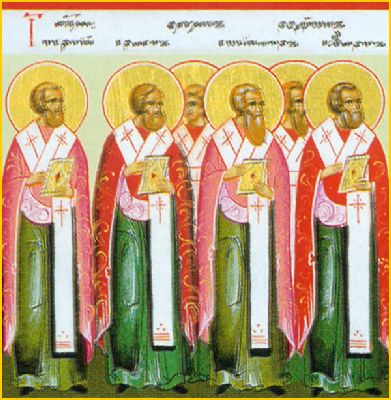|
|||
|---|---|---|---|
| This weekly bulletin insert complements the curriculum published by the Department of Christian Education of the Orthodox Church in America. This and many other Christian Education resources are available at http://dce.oca.org. | |||

Five of the seventy apostles are remembered together by the Church: Cleopas, Tertius, Mark, Justus and Artemas. The five all have interesting stories. Some became bishops, some were martyred, and one was the son of Joseph, the man betrothed to Mary. But the best known to us is Cleopas, to whom the risen Christ appeared on the road to Emmaus. Cleopas and his equally disheartened companion agree with the other followers of Christ that the news of His resurrection brought by the women was an "idle tale" (Luke 24: 11) not to be believed. Now they are walking the road to the village of Emmaus together and talking about it all. Jesus joins them, and their sad expression is as revealing as the forlorn tone of their words: "We had hoped that he was the one to redeem Israel." They do not recognize Him; they only know that what they hoped for has ended in disappointment. Here is where Jesus honors their intelligence and ability. He refrains from excoriating them for not knowing Him. He does not reveal Himself with a blast of glory that will completely overwhelm them and make it impossible not to recognize Him. Instead, He reminds them of what they already know: the Old Testament prophecies and "in all the scriptures the things concerning himself." He lets their minds and hearts work toward recognition. When they reach the village, Cleopas and his companion see that Jesus apparently intends to travel on. They invite Him to supper, still not knowing who He is, but glad for His company. At the table He again does nothing that will compel them to recognize Him. He just does the simple, warm thing He did so often during their years together. He blesses and breaks bread, and gives it to them. And that is how they come to realize who He is. Jesus honors them by allowing their discovery to be their own. There is another striking example of the way God honors us in Genesis 2:20, where we read that Adam "gave names to all cattle, and to the birds of the air, and to every beast of the field." There is no suggestion that God prompts Adam; the names are completely what the man wishes them to be. In Genesis' own words, "...whatever the man called every living creature, that was its name" (2:28b). The Qu'ran describes the naming of the animals quite differently. The chapter entitled "The Cow" tells us (8:29) that Allah "taught Adam the names of all things." Then Allah places these things before Adam and says, "Tell them their names." This is pure recitation, not at all the honor Genesis accords Adam by letting him use his abilities to create names. That honor is among the multitude of gifts given by the One who "gave himself for our sins to deliver us from the present evil age" as Paul writes in Galatians 1:4. |
|||
